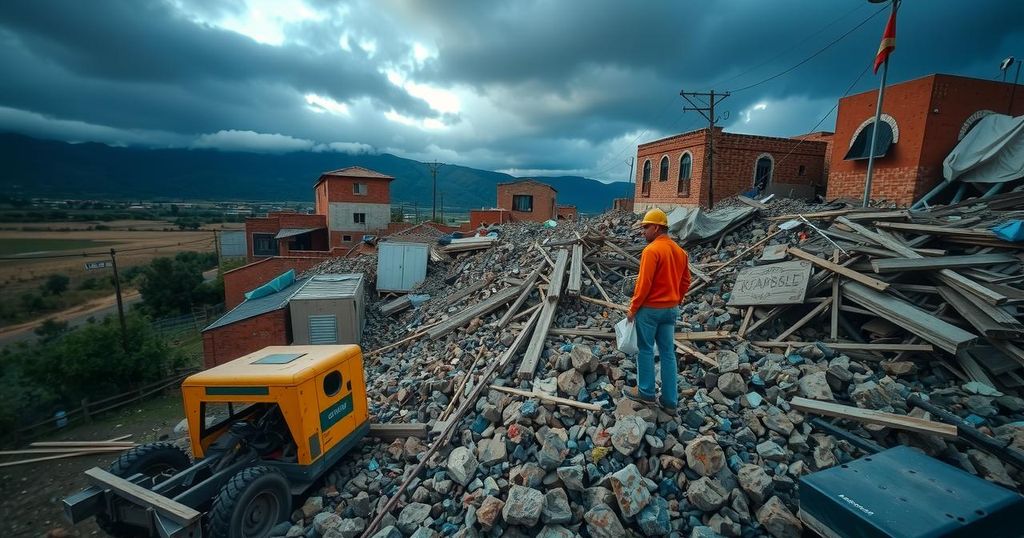Ecosia’s Role in Post-Earthquake Recovery Efforts in Morocco’s High Atlas Region

In September 2023, an earthquake devastated the High Atlas region of Morocco, destroying livelihoods. Ecosia pledged profits from a day of searches to the High Atlas Foundation to aid recovery efforts, resulting in the planting of 80,000 trees, repair of irrigation systems, and installation of solar panels. The initiative addresses the immediate needs of affected communities while promoting sustainable development.
In September 2023, the High Atlas region of Morocco suffered significant devastation from an earthquake that destroyed numerous farms and livelihoods. In response to this disaster, the search engine Ecosia initiated a philanthropic campaign, pledging all profits generated from searches on a specific day to the High Atlas Foundation (HAF). The aim was to facilitate infrastructural restoration and to plant 200,000 trees, once conditions permitted. A year later, the collaboration has resulted in the successful planting of 80,000 trees, repair of various irrigation systems, and installation of 60 solar panels in local villages. Yossef Ben-Meir, President of the High Atlas Foundation, noted that around 50,000 families in the region were affected, with some losing their homes entirely. “A village of 300 people lost half its people,” he reported in an interview, highlighting the tragedy faced by many communities, some of which were completely devastated while others experienced localized destruction. Pieter van Midwoud, Ecosia’s Chief Tree Planting Officer, stated that it was an obvious decision to dedicate a day’s profits to assist the earthquake-impacted region. “We are involved with close to 6,000 farmers in Morocco and many of the people we know live in those villages,” he remarked, emphasizing the urgency and importance of this assistance. Ecosia has been collaborating with the HAF for eight years, establishing eight new nurseries to supply seedlings to local farmers and cooperatives. The tree varieties planted, such as carob, olive, and nuts, are crucial for the agricultural resilience of the region against both erosion and climate change. Upon the earthquake’s occurrence, Ecosia decided to focus efforts on the most affected villages to assist with the restoration of their infrastructure, including terracing and solar energy installations. Ben-Meir emphasized the critical need to restore water infrastructure systems to aid community recovery. He elaborated, “Many of these communities want to plant trees as they transition from barley and corn.” Furthermore, a six-year drought had compounded the challenges faced by these communities, hindering rewilding efforts. Both Ben-Meir and van Midwoud reiterated the importance of creating sustainable revenue sources through initiatives, such as tree planting, that provide income and facilitate broader human development. Ecosia’s nurseries in the High Atlas are designed to be self-sustainable, producing the types of seeds that local farmers require. “We have basically created tree planting machines in the High Atlas mountain region, which is a great legacy to leave,” concluded van Midwoud.
In September 2023, Morocco was struck by a devastating earthquake that especially affected the High Atlas region, resulting in significant loss of life and infrastructure. The earthquake devastated local agriculture, which is a primary livelihood for the inhabitants. In the aftermath of this disaster, philanthropic efforts were mobilized, notably by Ecosia, a search engine committed to environmental causes. Ecosia has long partnered with the High Atlas Foundation to promote reforestation and sustainable agricultural practices in Morocco. This partnership not only aims to restore the damage caused by the earthquake but also to enhance the resilience of local communities against climatic changes and future disasters.
The collaborative efforts between Ecosia and the High Atlas Foundation demonstrate the profound impact of corporate social responsibility initiatives in times of crisis. By leveraging the profits generated from online searches, significant strides have been made toward restoring the livelihoods of those affected by the earthquake in the High Atlas region. The planting of trees and restoration of infrastructure reflect a strategic approach that addresses both immediate needs and long-term sustainability for the local communities. Overall, this initiative highlights the critical role that innovative partnerships can play in disaster recovery and environmental restoration.
Original Source: www.forbes.com






